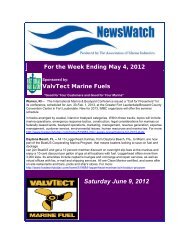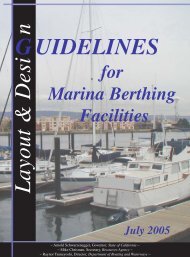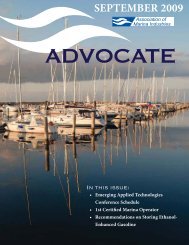Download a copy of AMI's Clean Marina best management practices ...
Download a copy of AMI's Clean Marina best management practices ...
Download a copy of AMI's Clean Marina best management practices ...
You also want an ePaper? Increase the reach of your titles
YUMPU automatically turns print PDFs into web optimized ePapers that Google loves.
Management-patrons<br />
• Provide convenient, well-marked disposal sites.<br />
• Put language in contract requiring proper disposal.<br />
• Post signs by solid waste receptacles that prohibit disposal <strong>of</strong> hazardous waste.<br />
• If your marina does not collect and dispose <strong>of</strong> hazardous waste on site, direct marina patrons about<br />
proper disposal <strong>of</strong> hazardous waste.<br />
• Use signs, mailings, postings on bulletin boards, etc. Post collection center locations near the waste<br />
receptacles.<br />
Storage<br />
• Store solvents and other hazardous materials in closed, fire safe containers that are UL listed or Factory<br />
Mutual approved and meet U.S. Department <strong>of</strong> Transportation standards. Approved containers will carry<br />
specification markings (i.e., DOT 4B240ET).<br />
• Plainly label all stored and containerized material. Mark the date accumulation begins and ends.<br />
If you are a hazardous waste generator you will need to designate Satellite Accumulation Areas and/or<br />
Accumulation Areas; containers must be labeled as Hazardous Waste and only the container full date needs to<br />
be on the drum.<br />
• Store containers on pallets in a protected, secure location away from drains and sources <strong>of</strong> ignition.<br />
• Routinely inspect the storage area for leaks. Generators must inspect their containers weekly and<br />
document the inspections.<br />
• Assign control <strong>of</strong> hazardous supplies to a limited number <strong>of</strong> people who have been trained to handle<br />
hazardous materials and understand the first-in, first-out policy.<br />
• Routinely check the date <strong>of</strong> the materials to prevent them from outliving their shelf life.<br />
Disposal and Recycling Methods<br />
Antifreeze:propylene glycol or ethylene glycol Recycle:<br />
Hire a waste hauler to collect and dispose<br />
Confirm your waste hauler will accept mixed<br />
antifreeze<br />
Purchase on-site recovery unit. Distillation systems<br />
are more expensive than filtration, but are more<br />
efficient<br />
Waste Oil: engine oil, transmission fluid, hydraulic<br />
oil, gear oil, #2 diesel, kerosene<br />
Recycle with a licensed waste <strong>management</strong> contractor<br />
Confirm your waste hauler will accept mixed oil<br />
Use waste oil for space heating<br />
Quart oil cans Drain completely and dispose in regular trash.<br />
They cannot be recycled<br />
Non-terne plated oil filters Puncture and completely hot drain for at least<br />
24 hours.<br />
Recycle the oil and the metal canister, or double-bag<br />
it in plastic and place it in your regular trash<br />
12












